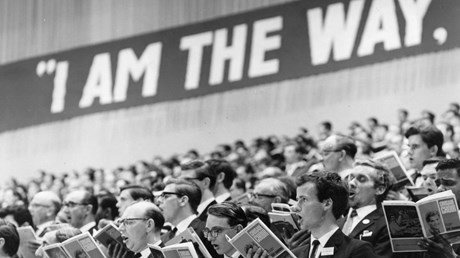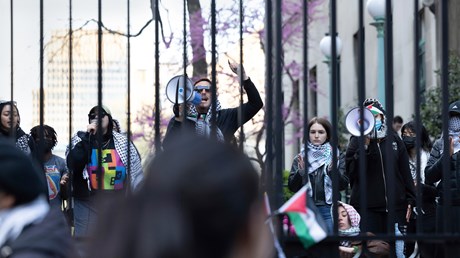Christianity Today Magazine
News and analysis from the world's leading Christian magazine.
News in this category: 29
Bookmark and share this category:
Subcategories
News
As the presidential election approaches, the incumbent government seeks to win support with aid to churches and pastors.
 In many countries, politicians try to win over religious voters by highlighting areas of shared interest between their agenda and the faithful’s priorities. In Venezuela, candidates are offering pastors cash.With less than three months until Venezuela’s presidential elections, incumbent Nicolás Maduro is expanding two initiatives specifically aimed at the evangelical community, which represents 30.9 percent of the country’s population.Bono El Buen Pastor (“The Good Shepherd Bonus”), created last year, and Plan Mi Iglesia Bien Equipada (“My Well-Equipped Church Plan”) offer resources to pastors and their churches, including cash, chairs, construction materials, and expensive sound equipment—no strings attached. Mi Iglesia Bien Equipada exists under Misión Venezuela Bella, a government program that invests in recreation and arts spaces, which has remodeled nearly 3,000 churches since 2019.At the beginning of March, Maduro gathered 17,000 people in a pastors-only event in the northern city of Carabobo and announced that 20,000 additional pastors had become beneficiaries of the Bono El Buen Pastor program, which would deliver a monthly stipend of 495 bolivars (around $14 USD) to each new member. (Venezuela’s minimum legal monthly wage is 130 bolivars or $3.50.)Officially, the government says the program aims to give churchgoers dignified spaces where they can develop their faith. There are, however, those who view the state’s generosity with some suspicion.César Mermejo, president of the Evangelical Council of Venezuela and a leader of the Federación de Iglesias Mizpa de Venezuela, called these efforts by Maduro an attempt to buy the souls ...Continue reading... In many countries, politicians try to win over religious voters by highlighting areas of shared interest between their agenda and the faithful’s priorities. In Venezuela, candidates are offering pastors cash.With less than three months until Venezuela’s presidential elections, incumbent Nicolás Maduro is expanding two initiatives specifically aimed at the evangelical community, which represents 30.9 percent of the country’s population.Bono El Buen Pastor (“The Good Shepherd Bonus”), created last year, and Plan Mi Iglesia Bien Equipada (“My Well-Equipped Church Plan”) offer resources to pastors and their churches, including cash, chairs, construction materials, and expensive sound equipment—no strings attached. Mi Iglesia Bien Equipada exists under Misión Venezuela Bella, a government program that invests in recreation and arts spaces, which has remodeled nearly 3,000 churches since 2019.At the beginning of March, Maduro gathered 17,000 people in a pastors-only event in the northern city of Carabobo and announced that 20,000 additional pastors had become beneficiaries of the Bono El Buen Pastor program, which would deliver a monthly stipend of 495 bolivars (around $14 USD) to each new member. (Venezuela’s minimum legal monthly wage is 130 bolivars or $3.50.)Officially, the government says the program aims to give churchgoers dignified spaces where they can develop their faith. There are, however, those who view the state’s generosity with some suspicion.César Mermejo, president of the Evangelical Council of Venezuela and a leader of the Federación de Iglesias Mizpa de Venezuela, called these efforts by Maduro an attempt to buy the souls ...Continue reading... |
A late historian explores how crusade hymns told both the classic story of gospel salvation and the evolving story of evangelical worship music.
 Crowds of over 50,000. Famous special guests. Hundreds of cities in the US and around the world. Beloved, catchy songs. For many, these might sound like readouts from the Taylor Swift Eras Tour hype machine. But exchange the glittery girl power for the gospel in baritone, and you have one of the most successful musical touring acts in the postwar world: the Billy Graham Crusades.The first association that “Billy Graham Crusade” may evoke is not musical at all, but rather a close-up shot of the evangelist, with his penetrating, wide-eyed gaze and raised forearms, thundering, “The Bible says …” Admittedly, music was not the main focus.Yet as the late historian Edith Blumhofer shows in her final book, Songs I Love to Sing: The Billy Graham Crusades and the Shaping of Modern Worship, neither Graham’s ministry nor the late-century rise of contemporary Christian music can be understood without it. As crusade song leader Cliff Barrows pursued his main goal—“sing to save”—he and his teammates bridged stylistic, cultural, and generational divides, transforming evangelicals’ music into the harmonic blend of old and new that is familiar today.Mining rich resourcesBefore unpacking this highly original book, a few words about the author. Blumhofer is an American religious historian renowned for her empathetic biographies of hymnist Fanny J. Crosby and evangelist Aimee Semple McPherson, as well as broader studies of evangelicalism and Pentecostalism. She concluded her career with this new study, sadly succumbing to a battle with cancer in the process.To finish the project, she tapped Jesus People expert Larry Eskridge, with whom she had for many years directed the Institute ...Continue reading... Crowds of over 50,000. Famous special guests. Hundreds of cities in the US and around the world. Beloved, catchy songs. For many, these might sound like readouts from the Taylor Swift Eras Tour hype machine. But exchange the glittery girl power for the gospel in baritone, and you have one of the most successful musical touring acts in the postwar world: the Billy Graham Crusades.The first association that “Billy Graham Crusade” may evoke is not musical at all, but rather a close-up shot of the evangelist, with his penetrating, wide-eyed gaze and raised forearms, thundering, “The Bible says …” Admittedly, music was not the main focus.Yet as the late historian Edith Blumhofer shows in her final book, Songs I Love to Sing: The Billy Graham Crusades and the Shaping of Modern Worship, neither Graham’s ministry nor the late-century rise of contemporary Christian music can be understood without it. As crusade song leader Cliff Barrows pursued his main goal—“sing to save”—he and his teammates bridged stylistic, cultural, and generational divides, transforming evangelicals’ music into the harmonic blend of old and new that is familiar today.Mining rich resourcesBefore unpacking this highly original book, a few words about the author. Blumhofer is an American religious historian renowned for her empathetic biographies of hymnist Fanny J. Crosby and evangelist Aimee Semple McPherson, as well as broader studies of evangelicalism and Pentecostalism. She concluded her career with this new study, sadly succumbing to a battle with cancer in the process.To finish the project, she tapped Jesus People expert Larry Eskridge, with whom she had for many years directed the Institute ...Continue reading... |
How groups like Hillsong learned to let go of the literal in favor of creative collaboration.
 The refrain “He is for you” doesn’t translate neatly into Spanish. In the English version of Elevation Worship’s song “The Blessing,” the phrase repeats and builds with each repetition. But in Spanish, the line is “Él te ama” or “He loves you.”“I’m glad the translators did that,” said musician and translator Sergio Villanueva, who pastors a Hispanic congregation at Wheaton Bible Church in Illinois. “To convey that idea in Spanish—‘He is for you’—you would have to use a lot more words. Spanish is a beautiful language, but we use more words and longer words.”The translation choice in “The Blessing” (“La Bendición”) reflects a growing interest among English-speaking worship artists in producing thoughtful, singable, and culturally informed translations of their music.Often, artists are intent on using translations that are as close to word-for-word as possible. But as influential songwriters and megachurches expand their reach, teams of translators are helping produce new versions of popular worship songs that are faithful to the originals without trying to replicate wording that isn’t as accessible or evocative in another language.“You have to honor the intention of the original songwriter, even if that means changing exactly what the words are saying,” said Villanueva, who has translated for Keith and Kristyn Getty, Sovereign Grace Music, and Kari Jobe.The international distribution and transl ation of English-language worship music has accelerated over the past four decades, but not consistently.In the 1980s and early ’90s, Integrity Music began releasing ...Continue reading... The refrain “He is for you” doesn’t translate neatly into Spanish. In the English version of Elevation Worship’s song “The Blessing,” the phrase repeats and builds with each repetition. But in Spanish, the line is “Él te ama” or “He loves you.”“I’m glad the translators did that,” said musician and translator Sergio Villanueva, who pastors a Hispanic congregation at Wheaton Bible Church in Illinois. “To convey that idea in Spanish—‘He is for you’—you would have to use a lot more words. Spanish is a beautiful language, but we use more words and longer words.”The translation choice in “The Blessing” (“La Bendición”) reflects a growing interest among English-speaking worship artists in producing thoughtful, singable, and culturally informed translations of their music.Often, artists are intent on using translations that are as close to word-for-word as possible. But as influential songwriters and megachurches expand their reach, teams of translators are helping produce new versions of popular worship songs that are faithful to the originals without trying to replicate wording that isn’t as accessible or evocative in another language.“You have to honor the intention of the original songwriter, even if that means changing exactly what the words are saying,” said Villanueva, who has translated for Keith and Kristyn Getty, Sovereign Grace Music, and Kari Jobe.The international distribution and transl ation of English-language worship music has accelerated over the past four decades, but not consistently.In the 1980s and early ’90s, Integrity Music began releasing ...Continue reading... |
The rage of the mob is a poor substitute for real community.
 This piece was adapted from Russell Moore’s newsletter. Subscribe here.As Columbia University and other elite campuses erupt into protests against the United States’ diplomatic and military support of Israel’s war against Hamas, US Sen. John Fetterman denounced the antisemitic speech of some of these protesters, remarking on the social platform X, “Add some tiki torches and it’s Charlottesville for these Jewish students.”Whatever one thinks of Fetterman’s analogy or of the Israel-Hamas war, we would do well to listen to the common ring of the Charlottesville chant, “You will not replace us! Jews will not replace us!” with the one recorded this week on the Columbia campus: “We have Zionists who have entered the camp!”An observer might have asked in Charlottesville, “What Jews are trying to replace you?” The white nationalists there would no doubt have told such a person that a shadowy cabal was seeking to import immigrants, to commit “white genocide.” Just so, another observer might ask at Columbia, “What Zionists have entered your camp?” Israeli military forces? No. The “Zionists” in question are Jewish students—one wearing a Star of David—attempting to walk on campus.At one level, the video of the students chanting seems almost farcical, like a parody out of an old episode of Portlandia. The leader yells out a sentence; the followers repeat it back—even to the point of repeating back, in unison, “Repeat after me.” Does that part really have to be repeated? Well, kind of; that’s part of what happens in a chant. The message is not reasoned discourse. The rote nature of the repetition ...Continue reading... This piece was adapted from Russell Moore’s newsletter. Subscribe here.As Columbia University and other elite campuses erupt into protests against the United States’ diplomatic and military support of Israel’s war against Hamas, US Sen. John Fetterman denounced the antisemitic speech of some of these protesters, remarking on the social platform X, “Add some tiki torches and it’s Charlottesville for these Jewish students.”Whatever one thinks of Fetterman’s analogy or of the Israel-Hamas war, we would do well to listen to the common ring of the Charlottesville chant, “You will not replace us! Jews will not replace us!” with the one recorded this week on the Columbia campus: “We have Zionists who have entered the camp!”An observer might have asked in Charlottesville, “What Jews are trying to replace you?” The white nationalists there would no doubt have told such a person that a shadowy cabal was seeking to import immigrants, to commit “white genocide.” Just so, another observer might ask at Columbia, “What Zionists have entered your camp?” Israeli military forces? No. The “Zionists” in question are Jewish students—one wearing a Star of David—attempting to walk on campus.At one level, the video of the students chanting seems almost farcical, like a parody out of an old episode of Portlandia. The leader yells out a sentence; the followers repeat it back—even to the point of repeating back, in unison, “Repeat after me.” Does that part really have to be repeated? Well, kind of; that’s part of what happens in a chant. The message is not reasoned discourse. The rote nature of the repetition ...Continue reading... |



 Links
Links  Articles
Articles  Blogs
Blogs  Videos
Videos  News
News  Colors
Colors 

 New links
New links

